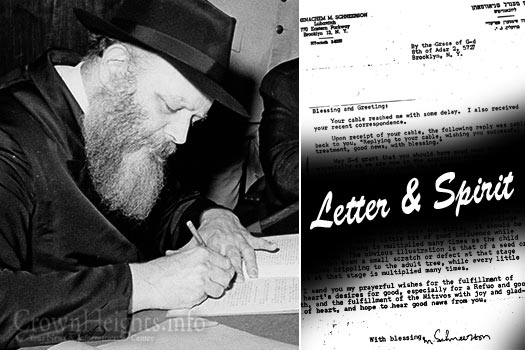
Letter & Spirit: Na’aseh Brings to Nishma
In this week’s edition of Letter and Spirit, in honor of Shavuos, we present a letter from the Rebbe in which he explains the concept of Na’aseh V’nishma with yet another perspective: the doing/Na’aseh brings to greater understanding/Nishma. The letter was written in English through the Rebbe’s trusted secretary Rabbi Nissan Mindel, and was made available by the latter’s son-in-law, Rabbi Sholom Ber Shapiro.
This weekly feature is made possible by a collaboration between CrownHeights.info and Nissan Mindel Publications. Once a week we publish a unique letter of the Rebbe that was written originally in the English language, as dictated by the Rebbe to Rabbi Mindel.
**********
By the Grace of G-d
Mr.
Greetings and Blessings:
I am in receipt of your letter, as well as of your previous correspondence.
I carefully noted the contents of your letter, in which you describe your vicissitudes, etc.
I trust that the frame of mind reflected in your present letter, particularly the indifference and despair which you mention, is a passing mood, and that it will be of very short duration. For a person who has been fortunate enough to receive G-d’s benevolence, and regardless of the circumstances, was privileged some time back to return to religious practice, it should be much easier to shake off such a mood, and become an active member of the Jewish people. You may also be active in the dissemination of Jewishness, namely the dissemination of the external values and way of life of our Torah, called Torat Emet, which means that it is true and can be subject to no compromise. It is well to remember that one of the basic foundations of the Torah is that the essential thing is the deed, namely the fulfillment of the mitzvot. Clearly the Reform movement, which you mention, offers no substitute, for the very term “reform” indicates that it is something which has been reformed by humans, and consequently it can no longer be considered divine. For if it were divine, it could not be reformed by man.
Thus, the only way to identify oneself with the Torah is through actually living it, by fulfilling its mitzvot. Indeed, right from the start, when the Jewish people received the Torah at Sinai, they accepted it on the basis of na’aseh v’nishmah. As a matter of fact, through the actual experience of Torah and mitzvot (na’aseh), one receives a better understanding of, and deeper insight into, the Torah and mitzvot (nishma). An obvious illustration of this can be found in the parallel of a person who is famished, and at the same time wants to know how nourishment will still his hunger. The way to do it is first to eat, and then to try to study, for if he should reverse the order and postpone taking nourishment until he knows how it was assimilated in his system, the very hunger will distort his powers of understanding and conception. Similarly, when a Jewish soul is famished for nourishment–its nourishment being the Torah and mitzvot--the proper procedure is to give it the needed nourishment first (na’aseh), and then it will be able to comprehend (nishma).
Much could be added to the above in discussing this topic, but I trust that for you the above lines will suffice, and that you will resolve at once to fulfill the mitzvot in daily life. May G-d grant you hatziachah to go from strength to greater strength in understanding Torah and, especially, in living the Torah.
With blessing,
*********
The above letter is from a forthcoming volume of The Letter and the Spirit Series, two volumes of which have been published to date, with volume three coming out shortly, IYH. The letters are from the archives of Rabbi Dr. Nissan Mindel, a personal secretary to the Previous Rebbe and The Rebbe, whose responsibilities included the Rebbe’s correspondence in English.
We thank Rabbi Sholom Ber Shapiro, director of Nissan Mindel Publications and the one entrusted by Rabbi Mindel, his father-in-law, with his archives, for making these letters available to the wider public. May the merit of the many stand him in good stead.














